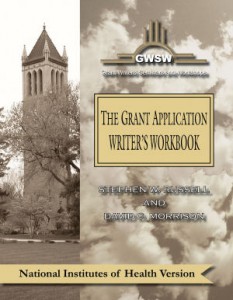Because our contact list has grown substantially since we began posting blogs more than a year ago, we thought this would be a good time to offer a summary of our popular blog series, “Dangerous Words to Avoid in Grant Proposals.” This blog series and our other blog posts are designed to complement the extensive information you’ll find in The Grant Application Writer’s Workbook. Our purpose is that the guidance you receive via our blog and workbooks will assist you in presenting your proposal to your reviewers in a clear, concise manner that they’ll appreciate. In the current competitive funding environment, it’s critical that you work harder and smarter than your competitors.
Our initial blog in this series focused on two words to avoid when writing your proposal: “If” and “Whether.” We clearly point out the traps you’ll encounter when you use these words and then we provide alternative options that will convey your research more clearly and precisely.
In the second blog we cover the usage of the terms “understand” or “to better understand.” Following extensive discussion of these terms, we note that “every applicant should have an objective where the endpoint can be precisely delineated.”
In the third blog we discuss the phrase, “To the best of our knowledge.” This is often used to justify a claim and seems to imply that you may not have taken the time to research something further or it may indicate that you’re missing some information. Another viewpoint to consider is that the reviewers assume that everything is written to the best of your knowledge-so it doesn’t need to be stated.
The fourth blog is written about a bit of a pet peeve of ours; that of attributing an action or activity to a noun, as in “Research shows…” Rather it is the results of the research that reveal something, or that “Recent research findings have provided strong evidence that…” This would similarly apply to “studies”, “investigations”, “examinations”, etc.
We cover the use of qualitative superlatives in Part 5 in this series. These are qualitative assessments not supported by hard evidence, such as “compelling”, “strong”, and “unique.” Also to be avoided are superlatives describing the qualifications of co-investigators, such as “internationally recognized”, “leading”, and “world leader in”. We’re sure you can come up with more of these.
Then there is the all-important usage of the word “grant” in Part 6. Of course, what you are writing is not a grant. It is either a grant application or a grant proposal. You might want to substitute the word “award” when you are tempted to indicate that you’re writing a grant. You wouldn’t be writing an award; thus, you’re not writing a grant.
In Part 7 we cover quite a number of errors made when writing about your expectations of what you expect to accomplish when the work is completed. Many examples are given here, with the bottom line advice being not to over-promise what you can do. As we always advise: Say exactly what you mean, and mean exactly what you say.
Finally, in Part 8 we consider what we call “glittering generalities.” These are phrases that sound very good; however, no one is entirely sure what they mean, or the meaning is not clear. There are a number of good examples shown to illustrate what a glittering generality is and how to avoid it.
We recommend that you take the time to carefully read each blog and consider how you might apply the information to your own grant proposal as a way to improve its readability. Your reviewers will appreciate it–and it may just make the difference between winning the grant and getting turned down.

